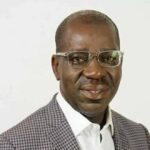
At the Admin Block, where I had to pay some fees and do some paperwork, something instructive happened. I came before a registration officer, who was in high spirits. He greeted me in Igbo but I answered in English. He looked at me from head to toe, and asked in Igbo what my name was. “I don’t understand Igbo.” “You don’t understand Igbo!?” he thundered. “You jus dey enter school, yanga don already start!?
“What nonsense! You’re ashamed to speak your mother tongue; shame on you!” Though a rascally laugh welled up in my stomach, I kept a straight face. When he simmered, he said, “Oyinbo, what’s your name?” “Babatunde Odesola.” His forehead creased in a frown. He asked, “Isi gini? What did you say?” I repeated, “Babatunde Odesola.” “You’re Yoruba?” I said yes. He jumped up from his seat in excitement and asked me, “Why did you queue up?” “You must never queue up in this school again. Anytime there’s a queue, you just go to the front and introduce yourself as Yoruba, they will attend to you first. Igbo are highly accommodative of strangers.”
In the twinkling of an eye, he got my papers signed, and kept looking at me as if I was newly orphaned, telling his colleagues, “See, see nwa Yoruba from Lagos! He has come here to school!” His colleagues, who were in separate cubicles, looked up, but weren’t convinced because, according to them, I looked Igbo.
So, they bombarded me with questions and assertions, “Are you from Lagos?” Ngwa nu, speak Yoruba make we hear. Why did you not choose UNILAG or Ife? Me, I have brothers in FESTAC, Mile 2 and Amuwo. Do you dance to Ebenezer Obey and Sunny Ade songs?
Ha, Yoruba sabi enjoy party o!…”
“E don do, Ozugo!,” my erstwhile taunter came to my rescue, “Una wan kill di boy with questions? We all laughed. During this interaction, I got to know I was the first Yoruba student to be admitted in the school. My new old friends urged me not to hesitate to come around if I run into any problem. They also charged me to take the gospel of Igbo love back with me to my kith and kin in Lagos. I felt on top of the world. I felt beloved. I felt proud of ‘one nation bound in freedom, peace and unity.’
For a four-year course, I spent five years; no thanks to the long strike embarked upon by the Academic Staff Union of Universities during the roguish Ibrahim Babangida era.
For the one-year, mandatory National Youth Service Corps scheme, I spent one and a half years because Umuopu community, which was my place of primary assignment, and the neighbouring Aji community, both in the Igbo-Eze North Local Government Area of Enugu Ezike, pleaded with me to stay back to teach their students.
Being the first ‘corper’ to accept posting to Umuopu, I had the privilege, along with my colleague, Johnson Umor (deceased), of attending elders’ meeting in the sprawling compound of the community’s oldest man, Onyishi.
My attraction to the meeting wasn’t the ceaseless land and palm tree disputes, it was the frothing palm wine in numerous gourds brought by each house in the community to the meeting. Verily, verily I say unto you, the years I spent in Igboland were the most exciting years of my youth. The Igbo man, outside his domain, is businesslike; within his homeland, he’s a goodwill ambassador.
For about seven years, I hardly spent a Christmas or New Year holiday in Lagos. My fellow Igbo students would have booked me all through the festive periods as I would move from one town to another like a well sought-after dibia. If you don’t know, the Igbo celebrate Christmas as if Joseph and Mary are next-door neighbours, they celebrate New Year as if it’s the last.
Despite orbiting in disparate spheres, science and religion are partly in unison over the common confluence that man emanated from. Indeed, archeology says earliest humans were found in Africa. According to Encyclopedia Britannica, foremost archeologist, Dr Louis Leakey, drove home this point in his 1934 groundbreaking work, ‘Adam’s Ancestors.’
On the strength of Leakey’s findings, the Encyclopedia Britannica says, “Fossil discoveries in East Africa proved that human beings were far older than had previously been believed and that human evolution was centred in Africa, rather than Asia, as earlier discoveries had suggested.”
I daresay a common thread among most religions knits man’s ancestry to a creative force that locates patrilineal supremacy within the locus of universal commonality.
Explaining why humans have white and darks skins, a UK-based magazine, BBC Science Focus, in an article entitled, “Why did white skin evolve?,” tows the Darwinian path of human evolution, linking man’s ancestry to apes, and saying man’s skin underwent changes in colour due to environment and climate.
As I began to learn the Igbo language, I was struck by the similitude between it and the Yoruba language. Here’s a teaser: Lend me your ears (nti/eti), my age mates (ògbo/egbé), as a give you a time-tested recipe for fever (iba/iba). Get a knife from the bag (akpa/apo) inside the box (akpati/apoti) behind your door.
Sharpen your knife on a stone (okute/okuta), and kill the goat (ewu/ewure) or turkey (torotoro/tolotolo) gifted by the medicine man in the house (ulo/ile) of the gods (olisa/orisa). Cut up and thoroughly wash the goat or turkey, add small (natikiri/kekere) quantity of salt into a pot of water (mmiri/omi), add three (ato/eta) cubes of Maggi to the water, add some onions (alubasa/alubosa), let all boil until your nose (imi/imu) begins to perceive the aroma of goat meat. At various intervals, add some potash (akanwu/kanhun), pepper (ose/ijose or ata), palm oil, utazi leaves etc. Uhmmm! What (gini/kinni) did you say? Im don’t know how to cook? Na you sabi.
Now listen, this my isi ewu peppersoup recipe isn’t only for fever and cold (oyi/oyi), it’s also for those seeking to have twins (ejima/ejire) – if eaten regularly – and I’m talking from experience! You’ll be blessed you if you can say amen (ise/ase) to my prayer, “May ill wind (ufufe/efufu) not blow your way, may you not live like slaves (oru/eru) in our land (ala/ile), Nigeria; may your mouth (onu/enu) not reject food. May you be detribalised enough to resist bad leadership.”
If science and religion link all humans to a common ancestry, and Igbo and Yoruba languages exhibit shared relationship, it’s apposite to aver that both tribes descended from the same God, same root, same family.
How can the Igbo and the Yoruba share so much in common yet be so diametrically opposed? For how long shall the Igbo and the Yoruba continue to live in political hate and suspicion when unity between them can answer the questions of restructuring and self-determinism?
The answer lies in the ability of the North in positioning itself and strengthening its grip on power. The answer also lies in the eternal greed and suspicion within the political class of the two tribes. Sadly, both tribes trust the North that has produced the most terrible leaders in the history of the country.
Potato chips have undergone many stages of refinement since Crum salted an order by a commodore in Saratoga Springs, New York, in the 1850s. Nigeria’s amalgamation of 1914 was a mistake, but we can’t forever bemoan our fate. We need to refine the machinery of governance to better serve the citizenry. The political leadership must sincerely unite ALL tribes and develop the country if the history of Nigeria would not be told under a tree in the nearest future, with the introduction, ‘once upon a time, there was a country…’.





